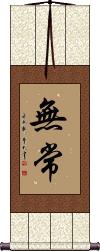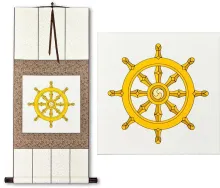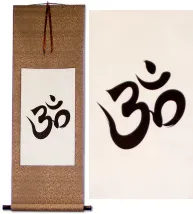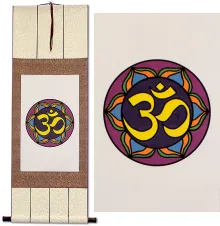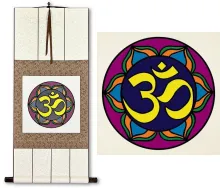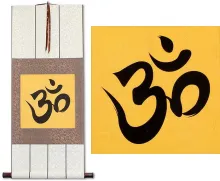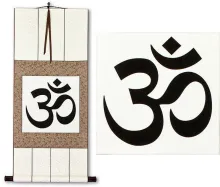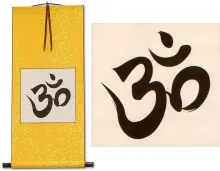Many custom options...
And formats...

Impermanence Buddhism in Chinese / Japanese...
Buy an Impermanence Buddhism calligraphy wall scroll here!
Impermanence
無常 is the state of being “not permanent,” “not enduring,” transitory, or evolving.
It can also mean variable or changeable. In some contexts, it can refer to a ghost that is supposed to take a soul upon death. Following that, this term can also mean to pass away or die.
In the Buddhist context, this is a reminder that everything in this world is ever-changing, and all circumstances of your life are temporary.
If you take the Buddhist philosophy further, none of these circumstances are real, and your existence is an illusion. Thus, the idea of the eternal soul is perhaps just your attachment to your ego. Once you release your attachment to all impermanent things, you will be on your way to enlightenment and Buddhahood.
Language notes for this word when used outside the context of Buddhism:
In Korean Hanja, this means uncertainty, transiency, mutability, or evanescent.
In Japanese, the definition orbits closer to the state of being uncertain.
This in-stock artwork might be what you are looking for, and ships right away...
Gallery Price: $72.00
Your Price: $39.88
Not the results for impermanence buddhism that you were looking for?
Below are some entries from our dictionary that may match your impermanence buddhism search...
| Characters If shown, 2nd row is Simp. Chinese |
Pronunciation Romanization |
Simple Dictionary Definition |
三教 see styles |
sān jiào san1 jiao4 san chiao sankyou; sangyou / sankyo; sangyo さんきょう; さんぎょう |
the Three Doctrines (Daoism, Confucianism, Buddhism) (1) Shinto, Buddhism and Confucianism; the three religions; (2) Confucianism, Buddhism and Taoism; (3) Buddhism, Shinto and Christianity; (given name) Mitsunori The three teachings, i.e. 儒, 佛 (or 釋), and 道Confucianism, Buddhism, and Taoism; or, 孔, 老, 釋 Confucianism, Taoism (aIso known as 神敎), and Buddhism. In Japan they are Shinto, Confucianism, and Buddhism. In Buddhism the term is applied to the three periods of Śākyamuni's own teaching, of which there are several definitions: (1) The Jiangnan 南中 School describe his teaching as (a) 漸progressive or gradual; (b) 頓 immediate, i.e. as one whole, especially in the 華嚴經; and (c) 不定 or indeterminate. (2) 光統 Guangtong, a writer of the Iater Wei dynasty, describes the three as (a) 漸 progressive for beginners, i.e. from impermanence to permanence, from the void to reality, etc.; (b) 頓 immediate for the more advanced; and (c) 圓complete, to the most advanced, i.e. the Huayan as above. (3) The 三時敎q.v. (4) The 南山 Southern school deals with (a) the 性空of Hīnayāna; (b) 相空of Mahāyāna; and (c) 唯識圓 the perfect idealism. v. 行事鈔中 4. Tiantai accepts the division of 漸, 頓, and 不定 for pre-Lotus teaching, but adopts 漸 gradual, 頓 immediate, and 圓 perfect, with the Lotus as the perfect teaching; it also has the division of 三藏敎 , 通敎 , and 別敎 q.v. |
豆佉 see styles |
dòu qū dou4 qu1 tou ch`ü tou chü zukya |
(Buddhism) suffering (from Sanskrit "dukkha") duḥkha, trouble, suffering, pain, defined by 逼惱 harassed, distressed. The first of the four dogmas, or 'Noble Truths' 四諦 is that all life is involved, through impermanence, in distress. There are many kinds of 苦 q. v. |
四法印 see styles |
sì fǎ yìn si4 fa3 yin4 ssu fa yin shihouin / shihoin しほういん |
{Buddh} (See 諸行無常,諸法無我,一切皆苦,涅槃寂静) the four signs of orthodox Buddhism The seal or impression of the four dogmas, suffering, impermanence, non-ego, nirvana, see 四法本末. |
The following table may be helpful for those studying Chinese or Japanese...
| Title | Characters | Romaji (Romanized Japanese) | Various forms of Romanized Chinese | |
| Impermanence | 無常 无常 | mujou / mujo | wú cháng / wu2 chang2 / wu chang / wuchang | wu ch`ang / wuchang / wu chang |
| In some entries above you will see that characters have different versions above and below a line. In these cases, the characters above the line are Traditional Chinese, while the ones below are Simplified Chinese. | ||||
Successful Chinese Character and Japanese Kanji calligraphy searches within the last few hours...
